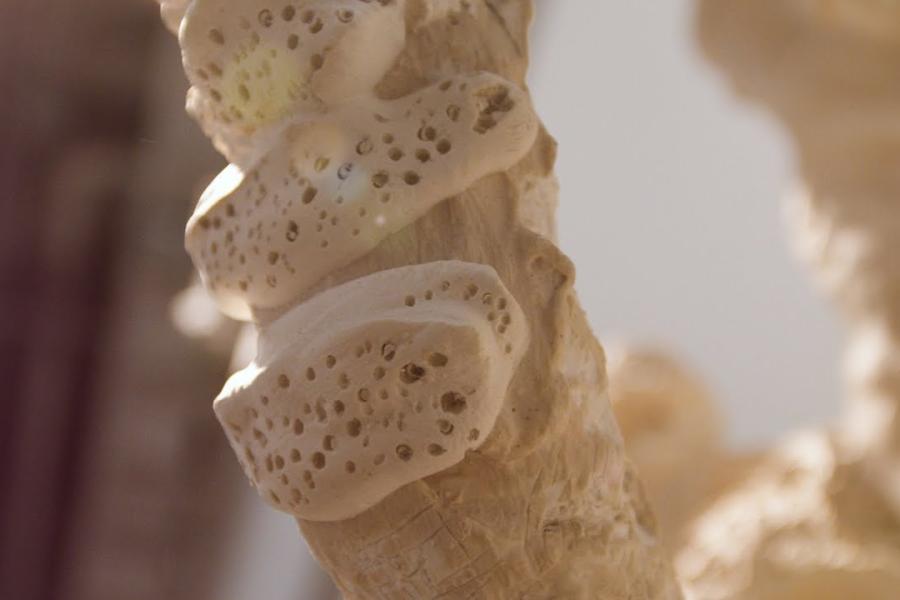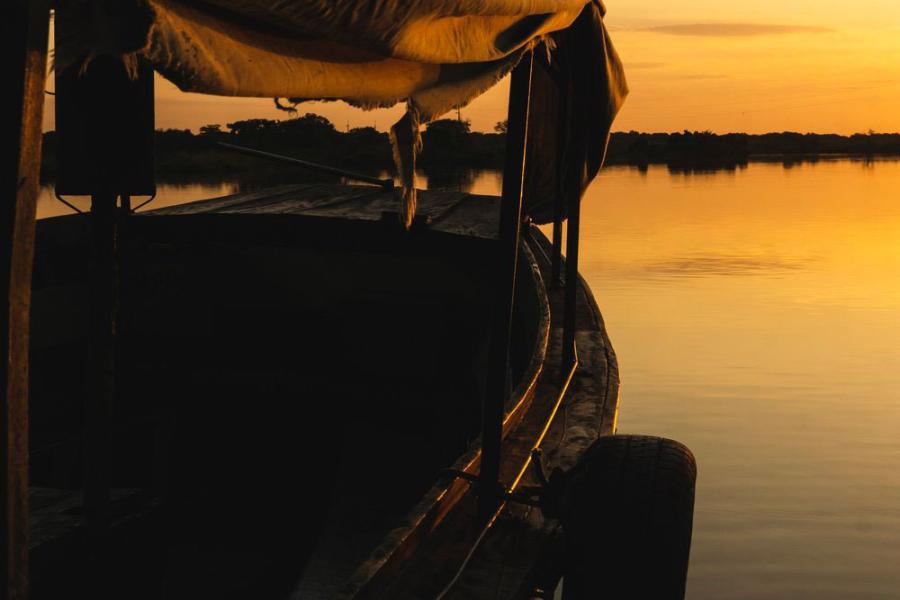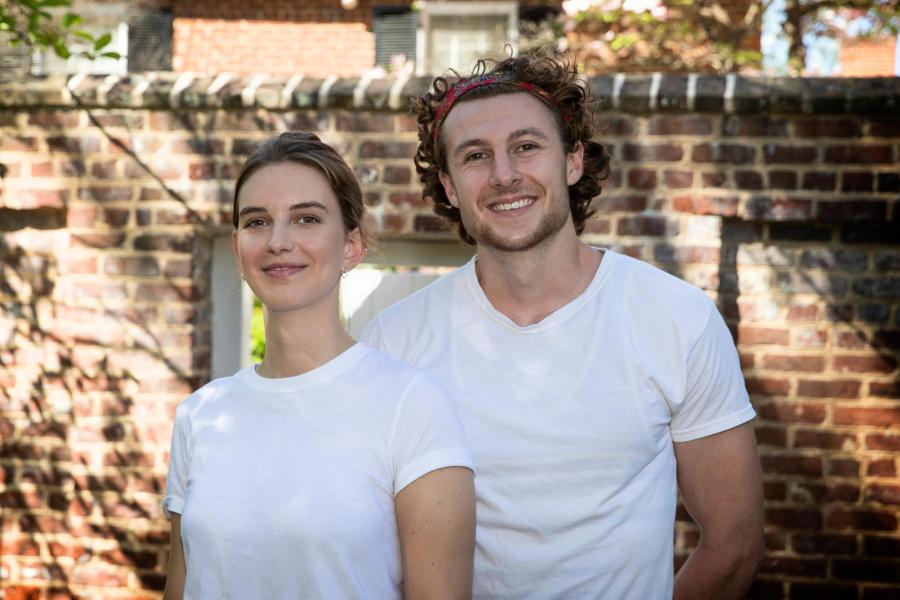Editor's Note: One in an occasional series about University of Virginia faculty members who are helping to make the University both great and good. Today’s installment features Esther Poveda Moreno, whose Spanish course brings students into the community to work with local organizations in the fields of immigration and education, health or social work.
Faculty Spotlight: ‘Woman of La Mancha’ Finds Her Calling Through Indigenous Literature, Service
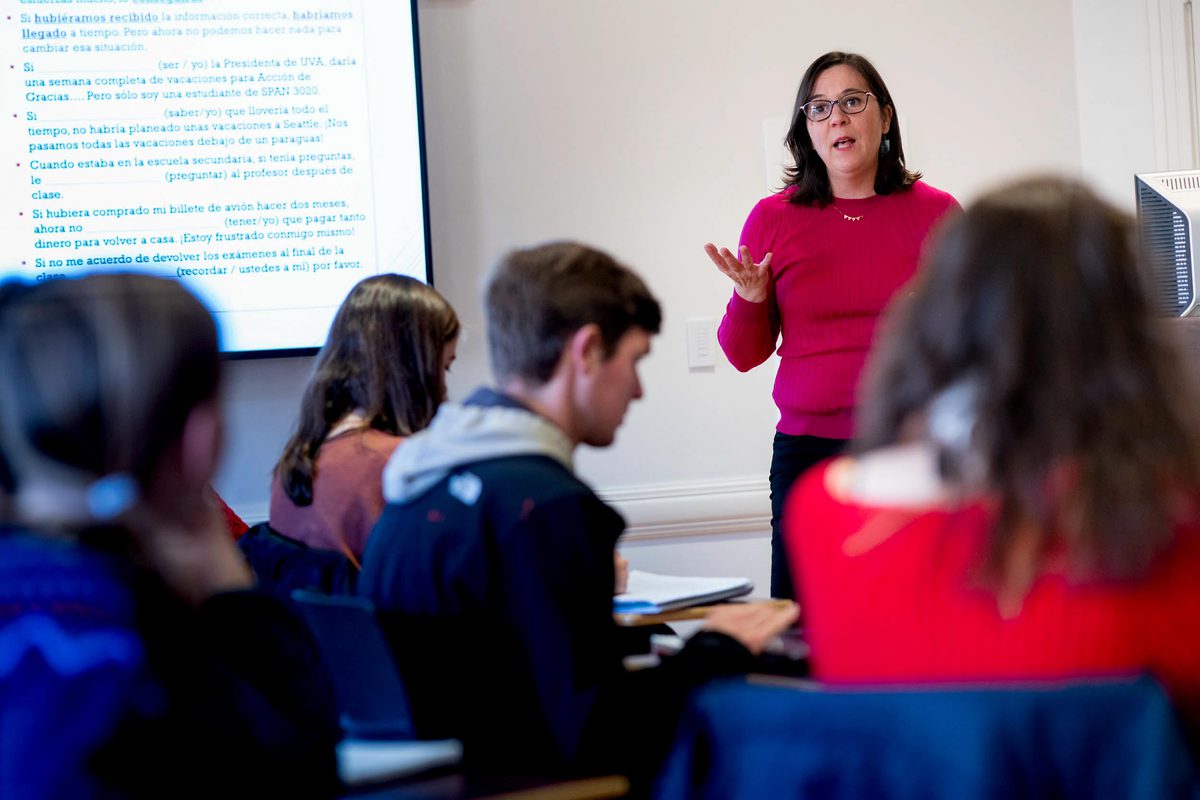
Born in Spain, Esther Poveda Moreno has long been drawn to Latin America’s indigenous literature. (Photo by Dan Addison, University Communications)
Most people know La Mancha as the region in Spain from which the title character in “Don Quixote” hails. But to University of Virginia senior lecturer Esther Poveda Moreno, it’s also where her parents once lived.
Living under a dictator until the mid-1970s, Poveda’s father, Miguel, ran a bodega. Her mother, María del Carmen, was a homemaker.
Neither went to college, but that doesn’t mean they weren’t educated.
“We would always read poetry at home,” said Poveda, who was raised with two younger brothers in Madrid, where their parents later moved. “We read newspapers, we watched the news and my father always had a genuine curiosity about history. He had a very reflective nature.”
As a child, Poveda remembers learning about politics and social movements in Spain and Latin America .
“Growing up in Spain, you get a lot of information about Latin America and there’s this connection in a kind of like a romantic or sentimental way,” Poveda said. “But a lot of people care about the legacy of colonialism and what it’s brought to these countries – so that was something that was discussed in my family and something that we all felt strongly about.
“I had always dreamed about going to Latin America and seeing with my eyes the resilience of the people.”
Several years later, Poveda – who said she has long been drawn to testimonies and indigenous literature – had the chance. While pursuing a Ph.D. in Latin American literature and Latin America studies at the University of North Carolina, Poveda spent a year doing research in Guatemala and working for an indigenous textile project.
“I think the history of my own country and the legacy of colonialism and how we perceive ourselves as Spaniards was something that always interested me,” Poveda said. “It was always fascinating that I could use my language and talk to people who were so different from me. There’s this huge connection there that I felt.”
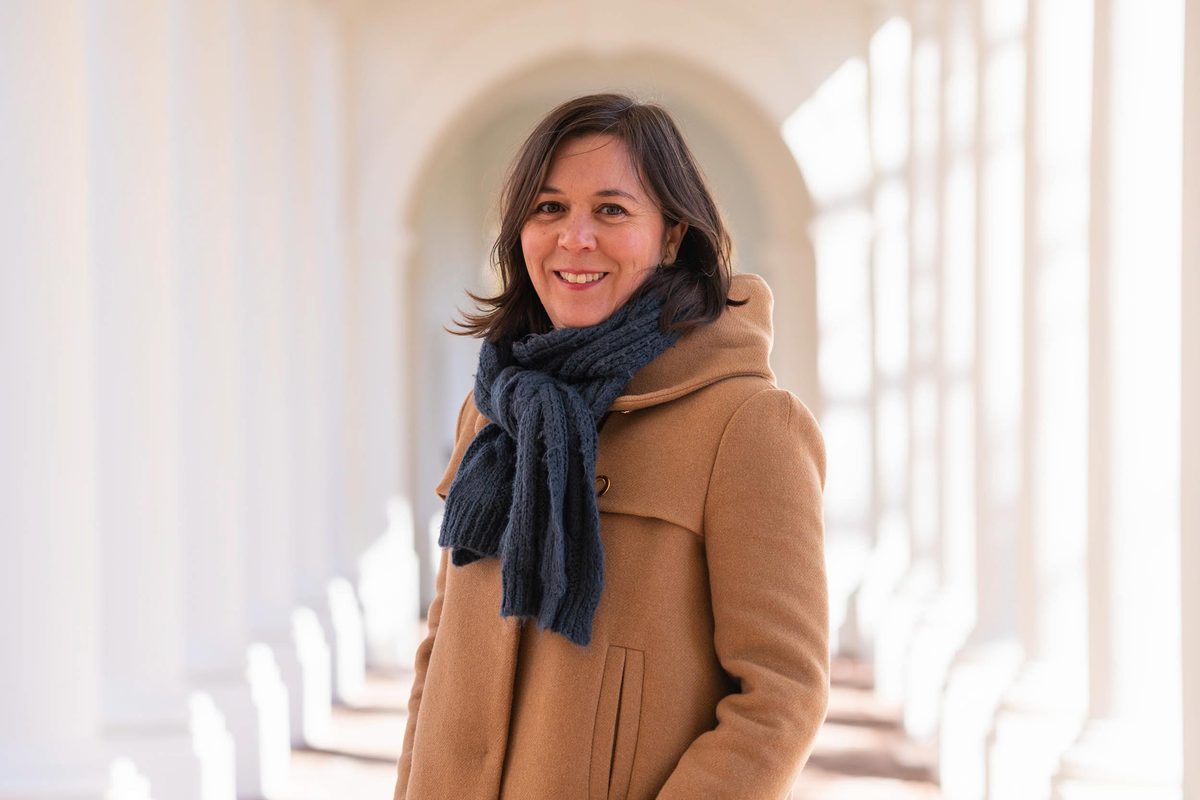
When Poveda came to the United States, she immediately knew where she wanted to go with her academic, and eventually, professional career.
“The tie that I could find through the language with people from other countries was so strong,” she said. “I was not a Spanish person so much, but a Spanish speaker. For me, the connection with the language made it a larger community in which I could make a difference.”
Poveda immersed herself in volunteer work for immigrant organizations. To this day, that’s still a huge part of her life.
As a member of the Charlottesville community, Poveda is part of several local initiatives that support and advocate for immigrant neighbors: the C’ville Immigrant Freedom Fund, the Charlottesville Immigrant Transit Assistance Group, the Hands Off Maria campaign (which seeks to protect a Latinx immigrant who has been granted sanctuary in a local church) and Sin Barreras.
Now in her eighth year at UVA, Poveda teaches “Writing for Social Justice and Change,” a Spanish course in the Civic & Community Engagement Program.
In the two-semester course, students hone their grammatical and writing skills while reading and discussing works by authors who have used writing as a tool for social justice and change.
In addition, they take part in a community engagement project through Madison House or the UVA’s Latino Health Initiative in which they must complete 18 to 20 hours of volunteer work with local organizations in the fields of immigration and education, health or social work.
“Their experiences inform the curriculum,” Poveda said. “For me, as a teacher, the biggest challenge is to bring together the experience outside of the classroom with what we do in class.
“We do regular reflections and talk about what it means to be a volunteer. We also talk about privilege and what it means to work for social justice.”
Katie Dodds, a second-year student in the College of Arts & Sciences, said the community outreach component of the class has been, for her, the most valuable part of the course.
Dodds has been working with Madison House’s Latinx and Migrant Aid Program, LAMA, at its Cherry Avenue site. Each week, volunteers work on homework one-on-one with children, in a pair that is sustained throughout the semester to facilitate close bonds between tutor and student.
“One might expect these kids to be somewhat behind in their schoolwork, since many of their parents speak little to no English, but these kids are bilingual and exceptionally smart,” she said.
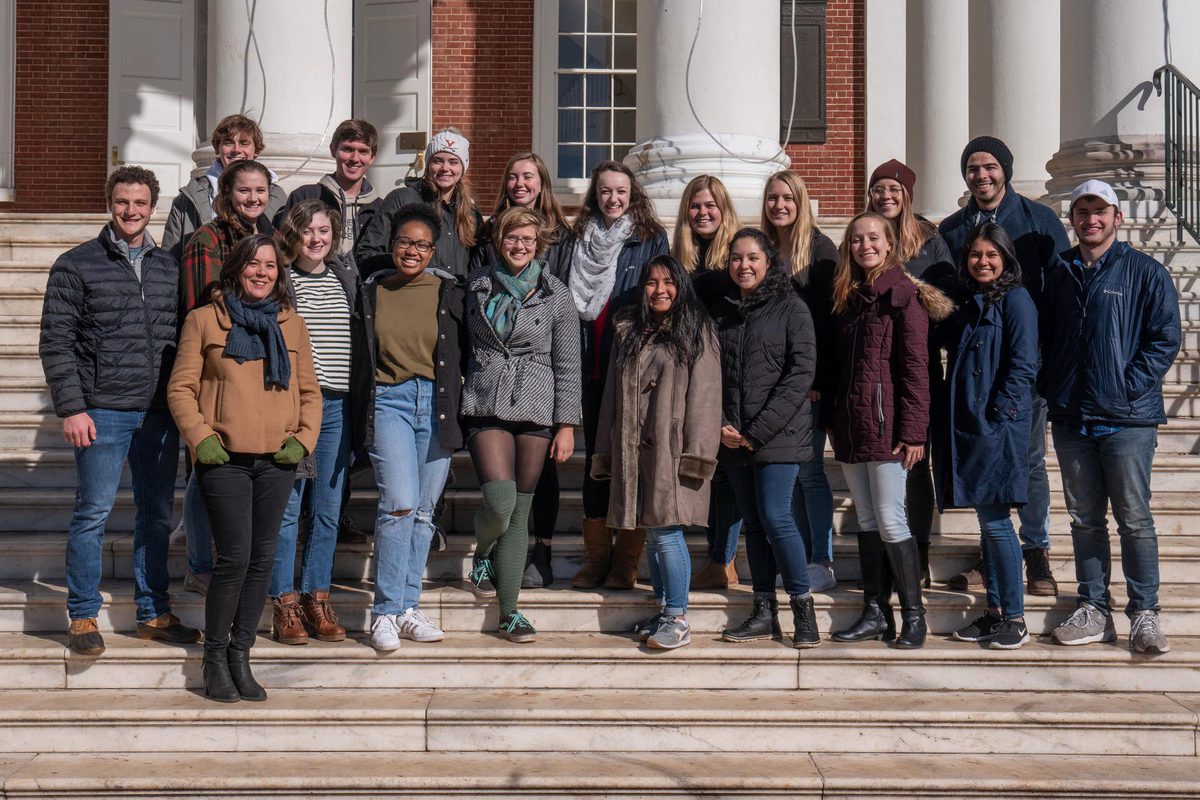
Dodds has found it rewarding to be able to interact with members of the community she is studying.
“That is the best and most accurate way to learn about the U.S.’s Latinx community,” she said. “It contextualizes our studies in a way that makes them even more real; having met immigrants who have gone through the struggles we are learning about in class with guest speakers and articles about immigration and xenophobia makes the issues so much more real to use and helps us humanize the statistics we read about in articles.”
John Garza, a fourth-year student in the College, said the course was gratifying on multiple fronts.
“I was able to not only help students learn about tricky grammatical tenses in English, but also was taught some new vocabulary in Spanish,” said Garza, who did his service through UVA’s Latino Health Initiative.
“When I think back on this class, I will always be reminded that good, meaningful service involves the development and maintenance of relationships, where both parties are able to freely communicate their goals.”
Which is really the whole idea behind what Poveda is teaching, according to Rose Cole, Madison House’s director of community engagement.
“Her students are thinking critically about the world, both their role in it as UVA students and as members of the Charlottesville community,” Cole said. “I think this is especially important in the context of language learning. I don’t think people often think about bridging cultural barriers and serving the needs of vulnerable community members as being an important part of an advanced Spanish grammar class, but it is a powerful way for students to learn.”
Poveda’s parents, who still live in Madrid, don’t speak English. But that doesn’t stop them from enjoying their visits to UVA; Poveda said her father is “enamored” by the history of the University.
From a young age, Poveda said her parents knew she wouldn’t do the “traditional thing” and live in Spain near them. Her adventurous spirit, kind of like Don Quixote’s, was just too great.
“They always thought I couldn’t sit still,” she said, smiling. “But they are very proud.”
Media Contacts
Manager of Strategic Communications University of Virginia Licensing & Ventures Group
wdr4d@virginia.edu 434-982-3791
